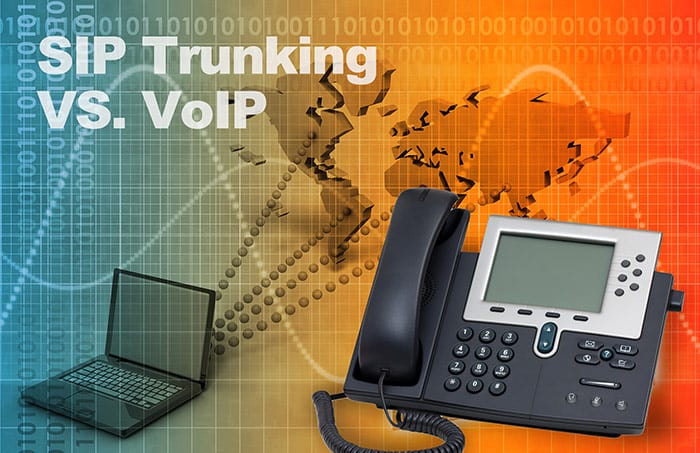To decide whether your business needs SIP trunking or VoIP technology, you must first understand what these communication services are and how they differ. Here we will discuss in detail how these two types of technology operate so you can make an informed decision when choosing between them.
Difference Between SIP Trunking and VoIP Technology
SIP and VoIP are often used interchangeably, which is why they can be misunderstood. SIP stands for Session Initiation Protocol while VoIP stands for Voice over Internet Protocol. Both of these services provide foundations for IP technology. That is, they enable users to make and answer calls over the internet (or virtual phone lines) as opposed to traditional phone lines or PSTN lines. But there are a few key differences that set them apart, let’s have a look.
What is VoIP? The Basics
Voice over IP or VoIP technology is a business phone solution that transmits voice messages over the internet. It converts voice into digital signals and sends them to the destination number or endpoint. To use this service, you will require a VoIP phone and VoIP system. Most providers will even offer you unlimited calling minutes as a better deal. And so, for basic voice communication, VoIP is an affordable and practical solution.
SIP Trunking Explained
SIP trunking enables the transmission of multimedia and unified communications over the internet. SIP technology builds on voice over IP to provide not only voice but other communication as well. That is, video messaging, text messaging, file and document sharing, and so on. SIP trunking, therefore, works as an all-inclusive phone solution.
For a business looking to provide multi-channel communication, SIP technology is an ideal solution. This is because it is more affordable than using multiple different platforms/services as all communication tools needed are located in one place.
SIP vs VoIP
Now for the difference between the two types of virtual telephony solutions:
1. Type of Sessions Transmitted — VoIP calls handle only one type of session and that is voice communication. SIP calls, on the other hand, handle multimedia sessions such as voice, video, text, etc.
2. Operation — VoIP calls operate only over an internet connection and need a computer to run the software. VoIP handsets, for example, must be attached and connected to a computer to be used. A SIP trunk, on the contrary, can work over any network; this includes ISDN, VPN, or the internet. Plus, SIP equipment can operate by itself and does not depend on a computer to function.
3) Handling of Traffic — Both systems differ in terms of how they handle traffic. SIP systems work along with an office’s private branch exchange or PBX system. These systems are designed to manage large amounts of traffic and data. You can also add an extra layer of security by getting a direct connection to your provider. VoIP technology, on the other hand, handles traffic from a central network, where a provider oversees everything. This is perfect for businesses that do not have the experience or time to manage their own systems. However, on the downside, such central networks can easily be overloaded by heavy traffic.
Choosing One for Your Company
Deciding whether your company needs SIP trunking or voice over IP technology depends on the type of communications you want to set up. The choice is not really one over the other because SIP is an advanced version of VoIP. Both services can boost your company’s phone system by offering more reliable and cost-saving options. Based on how you want to communicate internally and externally determines whether you need only voice or multimedia sessions. You can get both SIP and VoIP with United World Telecom. Sign up on our homepage or contact us to learn more.






